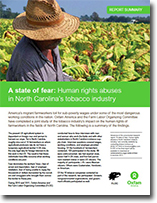Food writer Mark Bittman visits farmworkers in Immokalee
 Monday, May 23, 2011 at 8:18AM by
Monday, May 23, 2011 at 8:18AM by  Chris Liu-Beers
Chris Liu-Beers  Recently, Mark Bittman went to Immokalee, Florida to see for himself what has been happening with the workers who harvest nearly all of the winter tomatoes grown in the U.S. Bittman is renowned for his recipes and his long-running weekly New York Times column “The Minimalist,” and has appeared on dozens of TV shows.
Recently, Mark Bittman went to Immokalee, Florida to see for himself what has been happening with the workers who harvest nearly all of the winter tomatoes grown in the U.S. Bittman is renowned for his recipes and his long-running weekly New York Times column “The Minimalist,” and has appeared on dozens of TV shows.
Here are some of Bittman’s initial thoughts:
I spent a couple of hours talking to workers and organizers at the offices of the Coalition of Immokalee Workers, went for a walking tour of workers’ housing (the lattice over the windows is there to reinforce a ban on air conditioning, a ban that has been lifted in at least one instance as an indirect result of the recent agreement), even visited three workers in their “home,” and saw the house where several workers had once been held in slavery (not “like” slavery — slavery, as defined), chatted with one of the more progressive growers, and was driven through the fields, whose winter/spring crop is over, though not entirely picked…
Though far from North Carolina, the tales of abuse and exploitation from Immokalee are very close to home. We have seen cases of modern-day slavery here in NC, and we are all too familiar with the poverty wages and substandard living conditions so prevalent in south Florida.
But this story is not all bad news. While Bittman’s visit will help to raise the profile of farmworker issues, farmworkers themselves in Immokalee have been making progress over the last few years. The Coalition of Immokalee Workers has challenged major fast food chains and grocery stores to take responsibility for their supply chains. Many companies – though not all – have taken responsibility, and workers in Immokalee are starting to see the difference.
Field and poultry workers in North Carolina, including the Farm Labor Organizing Committee, are working to make changes here too. Nationally recognized experts on food – like Bittman and Eric Schlosser – are joining the conversation and making a difference.
Will you join it too? Click here to endorse the Harvest of Dignity campaign pledge.













